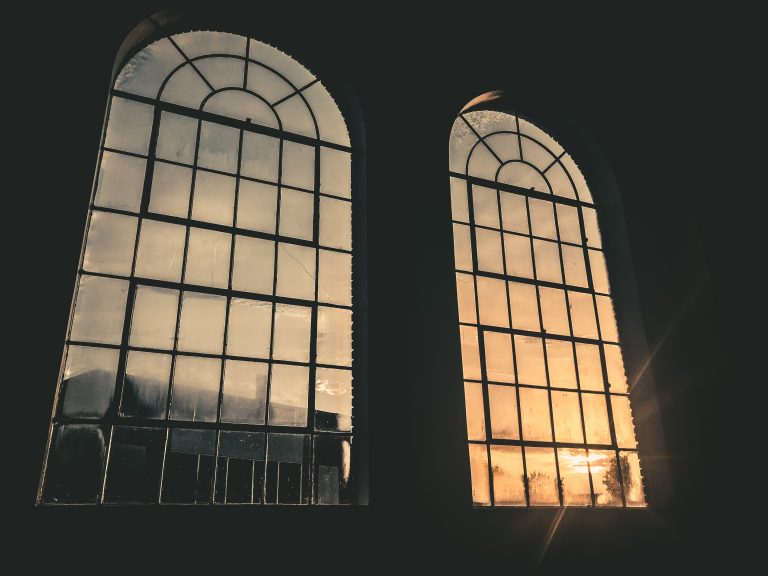The world is falling apart. Sickness is rampant. Death tolls rise. Our country is divided. Those enduring the agonies of racism cry out. We are isolated, depressed, anxious, afraid, hopeless, lost, and tired. We turn to God but there is no answer. We say, “Why have you forgotten us?” and “Are you alive?” and “Are you good?” but we cannot hear Him.
My sin is ever before me. Everywhere I go, it follows me like a shadow. In the quiet, it whispers to me. In the noise, it blares between the lines. It corrupts and consumes me. It takes and eats away at me until, at last, I ask, “Is it really evil?” and “Why would God prevent me from doing the one thing I love most?” Then I — all of us — see the world again and say: God must be evil or else He is dead. And then, there, we kill Him ourselves and He is gone from our hearts and minds. All that is left is silence.
It begins with only a seed of doubt. “Did He really say that?” we ask ourselves. Yes, He did. “He’s lying to you.” That’s the next step. “He doesn’t actually know what’s good for you.” This implies that He’s not actually good. If you listen close enough, you can hear the lisp of the serpent in that doubt. The enemy is crafty. Before you know it, you’ve taken the bite and, boom, you’re naked and ashamed.
Jesus’ temptation in the wilderness provides a profound contrast to Adam and Eve’s fall in the garden. While Adam takes and eats from the only tree he is denied, Jesus fasts and says, “Man shall not live on bread alone. …” While Adam questions God’s goodness, Jesus trusts and refuses to put Him to the test. While Adam reaches for power, Jesus gives His up. Both are tempted, both die, both bear the blame for all human sin. But only one deserves it, and that one is us. We are Adam and Eve.
Jesus’ very nature, God becoming man, shows his devotion to limitation. He constantly submits himself. His place on the cross is the ultimate representation of this paradox: God, who is life, dies. Again and again, God, the greatest Being in all creation, lowers himself to become nothing.
So, why does God make such a big deal about limitations? And why does He tell us to abstain from sin, to pray, to fast, to learn, to change, to suffer, and to die to ourselves?
I think the main reason is because the world we live in now is not the way it should be. This is not the garden. We have fallen from what was best. It is our sin that is to blame, not God’s. But God, in His mercy, took it as though it was His responsibility. He died so that we might live. He was bound so that we could go free. He uttered no sound so that we might sing. He was nailed to the tree, faced the silence of God, and cried out, “My God, my God, why have you forsaken me?” all so that we might hear His voice. Our world scoffs at this today.
To them, “life” is found in freedom — the ability to do whatever you want, whenever you want, so long as it is “your truth” and there is “consent.” They tell us we are in the garden now. But this is a purely consumeristic corruption of what God created life to be. This definition makes slaves out of men and women who, in pursuit of that relative truth, die because their truth does not match up with reality. This season of quarantine has left so many miserable because they can’t get what they want while they are confined in their homes, behind screens, alone or with family, without jobs, without money, without hope, and they despise it.
But freedom is not found in doing whatever you want whenever you want. Freedom is the ability to live into who God created us to be. It is found in humble limitation — surrendering our flesh in favor of God’s desires. If we live as though this world is all there is, this world will be all that we will get, because God allows us to get what we live for. We will die in the desert, unless we embrace the life found in limitation and the life that waits beyond it.
This season is an invitation to come out into the wilderness and submit to our limitations. Even as the world spins out of control, we can find life here because Jesus did too. We need to stop waiting around until COVID-19 goes away before we decide to live. There is so much life that can be found in weakness. If we really want to help people, then we have to stop treating God and the people around us as though the only way we can truly love them is if we are in control. We need to stop believing the lie that God cannot speak through our sufferings. Jesus is not going to come and fix our problems because He already did. The cross is God’s answer to our blame. He submits. Now, we are now His workmanship, His ambassadors, created in His image to bring the world into loving submission to God. But to live into this we must learn to submit ourselves.
I invite you, my fellow students, to submit yourself to the limitations that God has placed over you this semester. This includes everything from social distancing to mask-wearing, from homework to hall gatherings, from chapel to classes that you don’t necessarily enjoy. Rejoice, even in the desert place, because there, God’s glory is most made known when we continue to love despite our pain. I plead with you not to bind yourself to limitations God does not want in your life. This includes all bitterness, anger, hatred, malice, and slander against your friends, the school, the government, or even God Himself. These do not bring life and freedom; they only make us slaves. I ask that you submit and surrender as Christ has done so that we as a school can enter into a semester that is full of life and freedom despite the limitations. In doing this, we will see God’s blessings, and the world will look on in amazement at the fruit He produces in and through us. Others will understand that God is not silent — that He answers with one word, His Son, who chose humble submission — and that He is with us, even now.




